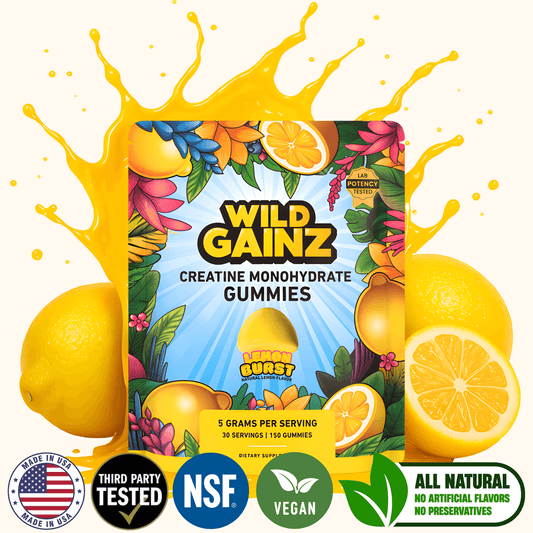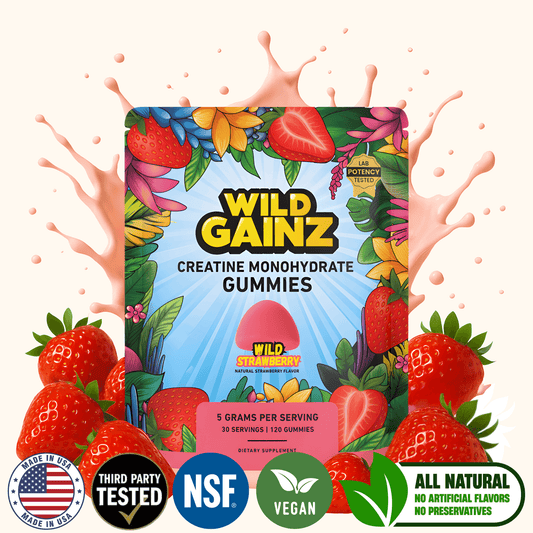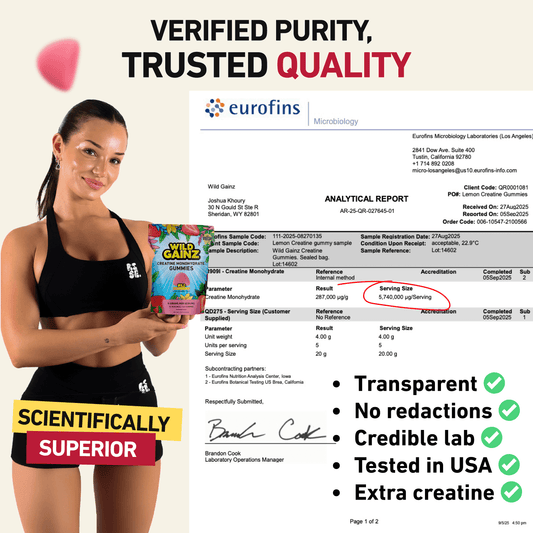Table of Contents
- What is Creatine?
- What is Creatinine?
- Is Creatinine the Same as Creatine?
- How Creatinine Relates to Creatine Supplementation
- Common Misconceptions About Creatine and Creatinine
- Choosing the Right Creatine Gummy Supplement
- Final Thoughts
What is Creatine?
Creatine is a naturally occurring compound found in muscle cells. It plays a crucial role in producing energy during high-intensity workouts and heavy lifting. Your body synthesizes creatine from amino acids, and it is also obtained from dietary sources like red meat and fish.
Creatine supplements, such as Wild Gainz Creatine Gummies, help increase intramuscular creatine stores, allowing athletes and fitness enthusiasts to enhance performance, muscle growth, and recovery. For a comprehensive overview of creatine’s benefits and risks, you can refer to Harvard Health’s guide on creatine.
What is Creatinine?
Creatinine is a waste product that results from the breakdown of creatine in muscles. Your kidneys filter creatinine out of your blood and excrete it in urine. Because muscle mass remains relatively constant, creatinine levels are commonly used as an indicator of kidney function.
Higher creatinine levels don’t necessarily mean kidney dysfunction. Factors such as muscle mass, hydration status, diet, and supplementation can impact these levels. For more details on how creatinine levels relate to health, visit Cleveland Clinic’s resource on creatine.
Is Creatinine the Same as Creatine?
No, creatinine is not the same as creatine. They are related, but they serve entirely different roles within the body. Here’s how they differ:
- Creatine – A substance stored in muscles that helps produce energy during short bursts of high-intensity activity.
- Creatinine – A byproduct of creatine metabolism that is excreted through the kidneys.
While creatinine is a result of creatine breakdown, it does not provide the same benefits as creatine supplementation.
How Creatinine Relates to Creatine Supplementation
One concern when supplementing with creatine is whether it increases creatinine levels. While creatine supplementation can slightly raise creatinine levels, this is generally not a sign of kidney damage. The increase is a natural byproduct of higher creatine stores and does not indicate impaired kidney function in healthy individuals.
Studies have shown that long-term creatine supplementation does not harm kidney function in people with healthy kidneys. However, if you have pre-existing kidney issues, it’s advisable to consult a healthcare professional before taking any creatine supplement.
For an evidence-based review of creatine’s safety, including its effects on kidney health, see this research-backed article from the Journal of the International Society of Sports Nutrition.
Common Misconceptions About Creatine and Creatinine
1. "Creatine Will Damage My Kidneys"
This myth stems from the misunderstanding of creatinine’s function. While creatinine levels can increase with creatine supplementation, this does not mean your kidneys are being harmed. Numerous studies confirm that creatine use is safe for individuals with normal kidney function.
2. "Increased Creatinine Levels are Dangerous"
Increased creatinine can be a concern in certain medical conditions, but a slight rise due to creatine supplementation is not harmful. It simply reflects increased creatine breakdown in your muscles.
3. "Creatine is Only for Bodybuilders"
Creatine benefits a wide range of people, not just bodybuilders. Endurance athletes, casual gym-goers, and even older adults can experience improvements in strength, performance, and cognitive function from creatine supplementation. Research has also shown cognitive benefits of creatine supplementation, particularly in older adults.
Choosing the Right Creatine Gummy Supplement
- Potency Testing & Transparency – Many creatine gummies claim to contain a specific amount of creatine per serving, but without third-party potency testing, there’s no way to verify it. Since creatine is highly water-soluble, improper formulation can cause it to degrade, leaving you with a weaker or ineffective dose. Look for brands that provide lab-tested results to confirm their creatine content.
- Country of Manufacturing – Where a supplement is made matters. Countries like the USA, Canada, and those in the EU have stricter manufacturing and quality control regulations, reducing the risk of contamination or misleading labels. Products made in less-regulated countries may contain lower-quality ingredients, inaccurate dosages, or even harmful additives.
- Creatine Type & Dosage – The most researched and trusted form of creatine is creatine monohydrate, so make sure the gummy contains this type. Additionally, check the dosage—some brands underdose their gummies, requiring you to take far more than necessary to reach an effective daily intake (typically 3-5 grams).
Why Choose WILD GAINZ Creatine Gummies?
✔ Lab-Tested for Potency – Each batch is third-party tested to guarantee you’re getting the full creatine dose per serving. No weak formulas, no misleading labels—just real results.
✔ Made in the USA – Manufactured in an FDA-registered, GMP-certified facility, ensuring top-tier quality, safety, and consistency. No cutting corners.
✔ High-Dose Creatine Monohydrate – Each gummy delivers a fully effective dose of the most researched and proven form of creatine. No blends, no nonsense—just the real thing.
If you’re serious about building muscle, improving strength, and maximizing your performance, WILD GAINZ Creatine Gummies are the best way to do it—without the hassle of mixing powders or choking down gritty shakes.
🔥 Upgrade your creatine game today—grab a bottle of WILD GAINZ Creatine Gummies and experience the difference. 🔥






